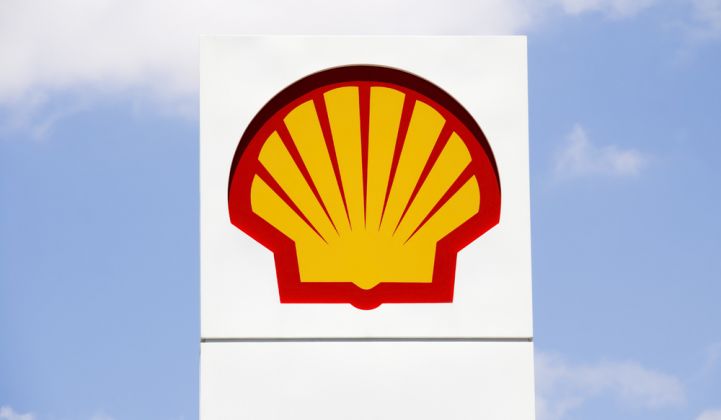Shell Energy North America, a division of the oil and gas giant Royal Dutch Shell, announced last week it has signed a purchase agreement for the acquisition of Texas-based MP2 Energy. The bid signals Shell’s growing interest in the power sector, including renewable energy and energy management services.
MP2 is a unique player in the electricity space with a diverse portfolio of assets and services. The company currently manages 1.7 gigawatts of power, including 30 megawatts of landfill gas, 30 megawatts of large-scale solar and 550 megawatts of wind, as well as 70 megawatts of natural-gas-fired peaker plants. MP2 also has around 40 megawatts of distributed solar, having partnered with SolarCity in 2015 to create a customer offering in Texas that closely resembles net metering.
In addition, the company has a roughly 550-megawatt demand response portfolio, which makes MP2 a leading demand response provider in ERCOT territory.
MP2 is also a retail energy provider for commercial and industrial customers in Texas, Illinois, Ohio and Pennsylvania. Through self-developed proprietary systems and technology, MP2 can work with those customers to manage and reduce their energy consumption through efficiency measures and distributed generation to hedge clients’ exposure to volatile retail power prices.
If approved by regulators, the transaction with Shell will enable MP2 to grow its renewables footprint and continue to innovate around product offerings across the company’s portfolio.
Shell Energy North America (SENA) and its subsidiaries currently trade and market natural gas and wholesale power, as well as environmental and risk management products. SENA’s retail energy business targets large commercial and industrial customers on the West Coast of the U.S. With the acquisition of MP2, SENA intends to build on those capabilities to grow market share in the large C&I customer segment and expand SENA’s footprint to Texas and throughout the eastern U.S. region.
"As Shell continues to expand its energy focus, we will strive to bring customers ever more innovative commodity solutions, including the deployment of new energy management tools," said Glenn Wright, vice president of SENA, in a statement.
While MP2 isn’t the largest company Shell has purchased, the acquisition is significant in the broader energy landscape. Oil companies have toyed with entering the renewables space over the decades with mixed success. But, as GTM’s Energy Gang recently debated, it may now be time to take the majors more seriously. A recent report from Wood Mackenzie concluded that wind and solar have reached a price point where they’re simply impossible for the world’s largest oil and gas companies to ignore. The MP2 deal signals a growing interest among oil majors to diversify their portfolios into lower-carbon resources.
Royal Dutch Shell in particular has been relatively aggressive in the power sector, with a demonstrated interest in natural gas, renewables, storage and grid management. Shell Technology Ventures co-led a $14 million investment in Sense Labs in 2016 and led a funding round in Geli last year worth $7 million. Shell’s venture arm also participated in a funding round for Aquion Energy in late 2014. Earlier this year, however, Aquion declared bankruptcy.
On the solar side, Shell recently built up an internal team to focus on solar development, led by two familiar former solar faces: Marc Van Gerven, formerly of Q-Cells and First Solar, and Boris Schubert, another Q-Cells alum who also worked at ET Capital. The solar arm is reportedly interested in developing international and corporate solar projects, but it’s still early days the team.
"Oil majors have been making investments in the power sector for years, and some of them are seemingly on a trajectory to evolve into broader energy companies, rather than remain exclusively oil companies,” said Clare Magee, principal consultant with Wood Mackenzie and GTM. Magee formerly served as solar program director at MP2, but was not privy to negotiations related to Shell.
What makes MP2 interesting, said Magee, is that the founders have deep expertise in power markets and energy trading, and have been able to use that knowledge to make renewables pencil out economically in competitive markets. In the case of solar, MP2 found a strong correlation between when solar generation spikes and when power prices in ERCOT territory are high, and was able to turn that into a compelling service.
“That’s why MP2 is such an interesting shop -- they make renewables fit the market,” said Magee. “They’re very innovative in that they evaluate all energy resources -- distributed, green, brown, centralized and otherwise -- purely as opportunities. Everything is assessed in the context of the power market. And it's a win for renewables to compete on that level.”
"In the ERCOT market, as in other competitive markets that we see across the country, it’s the market pulling renewables along,” she added. “It’s not necessarily a renewable portfolio standard. Low-carbon resources like wind and solar happen to be cheap resources, and are frequently some of the first resources ingested into SCED.” SCED refers to Security Constrained Economic Dispatch, which ERCOT defines as "the real-time market evaluation of offers to produce a least-cost dispatch of on-line resources."
Following the acquisition, MP2 will continue to be managed by the existing MP2 management team as a wholly owned subsidiary of SENA, according to a June 29 press release. The deal is expected to close in the third quarter of 2017. Financial terms were not released in the initial announcement.
MP2 will speak at the upcoming U.S. Power and Renewables Summit in Austin, TX, November 7-8. Learn more here.



